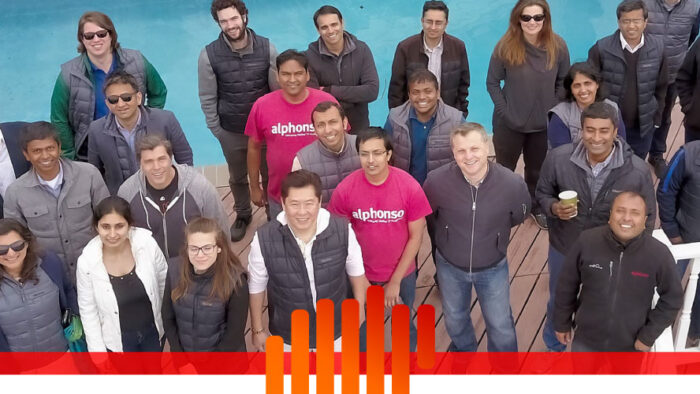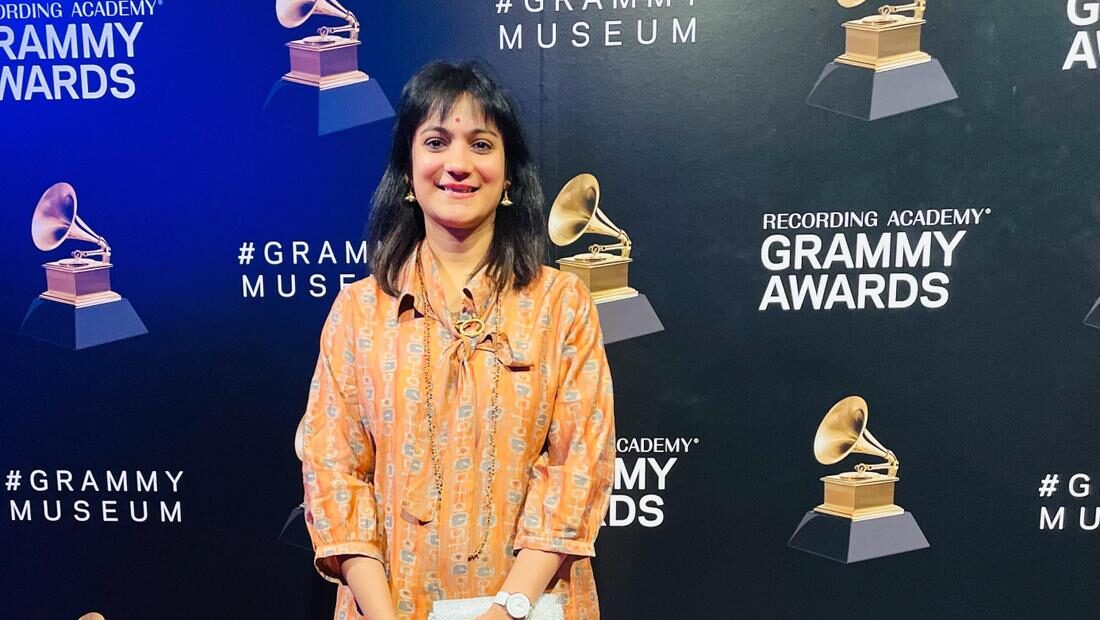Raghu Kodige and his co-founders named their television data measurement company Alphonso as they were keen on being listed high on the stock exchange, with a name starting with the letter A. Of course, the name has raised curiosity among non-Indians wanting to know what it means. For folks in India, it brings back memories of summer days and scrumptious mangoes. It also meant they would precede another fruit - Apple on any listing.
Raghu’s journey from his engineering days at Mysore in India to a Silicon Valley success story has been a tale of hard work, sacrifices, risk taking and success. After stints at many corporates, he took the plunge as an entrepreneur, not without apprehensions. “I had to second guess myself many times, often asking - what am I doing here now.”
Since 2013, Alphonso has been building the industry’s largest TV data set – one that enables powerful one-to-one targeting of TV audiences across all screens and best-in-class TV ad analytics then enables brands to see the offline impact of their campaigns. Today, Alphonso’s products and services have over 33 patents in the US for TV Retargeting and TV Ad Analytics.
The journey of Raghu Kodige - Founder and CPO
Raghu left plush jobs at Yahoo and Microsoft to start out on his own. Of the transition he says, “I think I got bored out of my brains at Yahoo so that's really what forced me to do something else. I spent about 10 years there and over time it became a lot more political than anything else. In the big company syndrome, there's a lot of territory and fiefdom.”
At this point of time, he decided to take a break and go to Wharton Business School, the typical Indian trajectory, in the belief that Business school would teach him all the things he needed to become an entrepreneur. “One of my professors used to joke that none of us joining Business School was going to become an entrepreneur, because we were taking the safe route again. That is when I realised that if I didn't just jump into the fire, and instead want all the tools of the trade, and everything certain, if I was not willing to take risks, then I was unlikely to become an entrepreneur.”
Raghu then started looking for a start up where he could get hands-on experience, moving from Yahoo to a smaller set up founded by ex-Yahoo employees, staying there till that company was acquired by Microsoft.
“So I was now back into a big company and this was even worse than Yahoo. Microsoft was even bigger and even more slow moving than Yahoo. Through that journey I realized that if you want to take a risk as a startup, you better do that as a founder. Because the risk to reward proportion is significantly higher if you're a founder versus someone who works at a startup. You will still do all the hard work, but because you're not the founder you don't have the same amount of equity or rewards.”
Raghu along with seven other friends, all of whom he had worked with over the years, started Alphonso Inc, eight years ago. In January 2021, LG Electronics (LG) and Alphonso announced a significant investment by LG in Alphonso to bring together the two TV industry leaders’ technologies and innovations to LG’s smart TV lineup. With this investment of nearly USD 80 million, LG will become Alphonso’s largest investor with a controlling stake of more than 50 percent.
“LG and Alphonso have a shared vision for advancing the smart TV ecosystem through innovative software and services oriented toward modern new consumer experiences on one end, and highly flexible, lucrative advertising, planning, and measurement offerings for brands, agencies, and broadcasters on the other,” says the press release.
Alphonso has changed over the years as any start up would do. “As an early stage startup you basically learn a lot of things on the job. However, as a team we had some idea of what we wanted to do and I don't think we have deviated too much from where we started. But we did learn a lot from the market. You think of an idea, and you start talking to people. Either they say they love it or they'll say ‘Well there's Google or some other company, who can do this better. You hear a lot of that.”
The team would course correct quickly, but what put them in a different path from day one was the realisation that if they had to grow, then they would need to generate revenue. The initial difficulty in raising capital from the market paved the way for this. “A lot of startups get funded really well in the beginning, so they don't worry about revenue as much. And, as a result, the whole company culture, how you operate all of that changes and, eventually, you may get to a point where you have run out of the money that you have raised and you haven't figured out how to make money yourself. If you can't raise any more in the market you're toast. So most companies or most startups even in the Bay area, in two to three years time they'll get to that point and they die. If they are lucky, by then they would have built something very interesting so that they can keep getting funding or someone will buy them and the journey continues.”
Even as Alphonso struggled to raise money initially, they kept trying to understand market trends. Raghu says the overall culture of the company was ‘very scrappy’, another term for thrifty. “That attitude became our motto, and the people we attracted were also those who enjoyed the work or were thinking ‘this is going to be something big so I'm willing to take the risk. I would say having less financial resources kind of shaped the company in a different direction than what we had originally thought so.”
Where is the germ of the idea of successful entrepreneurship sown if not in conventional business schools and corporates? Even in India, Raghu says, if one takes the example of the big successful E-commerce companies like Flipkart, they have been started by very young people. “These days companies are being started by people who haven't even spent time working in the industry for many years. But the one thing that I think is probably common for all of them is they're very brave and willing to take a risk right.”
Raghu himself worked for 10 years building a cushion, thinking that if he didn’t bring home a salary for many years, it would still be alright. “So whatever risk taking I did it was much later in my career. But there are a lot of youngsters who are doing that literally like a couple of years out of college - willing to take the risk and that's also what one is seeing in the overall job market in India. People are jumping jobs more often compared to their parents who stuck to these big organizations their entire life. I think that is what is helping corporate India. With all these new ideas and startups, some of them won't won't succeed but people overall are getting richer in ideas as a result of these examples being set by these young folks.”
One would have thought that Raghu’s startup idea was something that the industry would have developed simultaneously with product development. Wouldn’t advertisers know about the markets they are investing in? Appears not. “I think it's sort of the worst kept secret in the industry. In some sense, everybody knows that Television spending is the highest compared to other digital media but it's also the least scientific. There is really no meaning to it. People do it by intuition because they've been doing it forever.”
If a company spends 2 million dollars on TV ads and their profits were good, they assume that there is a direct correlation. And while there is market research and surveys and other tools for Television trends, they are not very scientific, says Raghu. “If you compare that with what people are spending on Google or Facebook, or any other digital media, every single thing is measured, every impression is counted and then you follow the customer journey from the time they saw the Ad to the purchase and you can kind of at least quantify how one led to another. Whereas in television it's a lot of vague science, and the problem is not having the right technology there.”
Now with smart TVs coming in, Raghu and his team are building the technology into the TV itself and that is what brought LG, one of the world’s largest TV manufacturers to their business. “We zeroed into an opportunity that arose when TVs got connected to the internet. At least in the US, the number of connected TVs is very, very high. So if you can put software in the TV that allows you to get this data, then for people who are selling the hardware this suddenly becomes a new way of making revenue. This has taken off significantly in the US and it's coming to the rest of the world.”
The hardware manufacturers - the TV makers - are suddenly seeing that the TV that they sell need not make all the money. “It's just a device in someone's house and then the money you make out of data and advertising and all of that can be far greater than the profits you make from this initial sale of the TV. So that's what is driving our growth. This opportunity now with LG arose because they realize they are making far less money from TV sales, than what Alphonso is making from the data that we are providing them. So they thought ‘why not work with Alphonso and incorporate that into LG’.”
Data sharing and privacy issues have been well thought of by Alphonso. “It's very important to have consumer consent, value exchange and transparency. All three things need to be there. Something like Amazon's Alexa has taken over the world. Everybody in the US, has not one but multiple Alexa devices. And these devices are constantly listening to you, so they are invading your privacy, more than any other device. But the benefits outweigh the concerns to a consumer.”
People believe that this invasion is transparent, that Amazon is telling customers what it is doing, with a promise that they won’t share this data. “So you have to essentially build consumer trust by being very open and transparent, and secondly, by delivering some value. That's kind of the principle we've tried to apply. It's like telling people why it is helpful for them to give us all this data. So that, in return, we can start recommending what shows they should watch, even offering services where the TVs are able to adjust your picture quality and your sound for different types of things that you watch. For instance while watching sports you want to watch with a certain sound and picture quality, for movies, you want different color levels or brightness and so on. In the TVs outfitted with Alphonso, everything changes automatically to the format you prefer.”
Changing Corporate Indian culture
Raghu says that the younger generation is carving out its own identity in corporate culture. “I would say the younger generation is doing a much better job of having the right culture compared to the older generation in India. There are a couple of things I notice when I work with someone who is from the old school - there is definitely a lack of trust. You always feel like you know there's some angle that you don't understand, some ulterior motive or something else that's driving the decision. That’s changing now.”
The influence of the success stories of entrepreneurs in the bay area is having a cascading effect on the diaspora in general. “I think they're very closely connected, I think most people are now coming here because they have more examples to follow. They know that people who have gone abroad before them have done well, they know that they're working in good companies, they're starting their own companies and so on. That drives more people to follow them, It is also leading a lot of people from the US to go back to India and set up companies there.”
The Indian market is expanding fast and that is exciting for professionals. “There are a lot of people who prefer to stay in India, because there are a lot more opportunities. The Indian market is growing faster than the US, so that is attracting a lot of talent. People are starting to think - if the bigger companies are investing heavily in India, why should I go abroad, I can do all of this here. Or people want to go to the US for a few years to gain some experience and use that to come back and work. It doesn't feel like there’s much difference between India and the US these days. There is a lot of movement of people in the software industry and medicine and so on, between the rest of the world and India.”
In terms of having Indians as CEOs of big corporates, does that have an impact on Indian prestige and influence? “I don’t think that has any benefit. I don't think people are doing any favors as such. Just because Google and Microsoft both have Indians at the top, I don't think that has any huge influence in what they're doing with India. But India is a big market for everybody, no one can ignore it. Amazon and Google are spending billions, not because those people love India, but because of the market. There is the power of the market and talent.”
Raghu says they have found it harder to hire in the US than in India because, “we have more connections in India. We know which colleges to go to and how hiring works. The talent is just amazing. I don't need to go to Stanford to hire the type of people I need. I can go to one of the IITs and I'll get the same or better talent. I think this is what is driving the profile of India a lot more than someone being the CEO of a big multinational.”
Kailashnath Munipella, technology expert, asked Raghu about his strategy to have offshore centers in India, with headquarters in the US, in a kind of intercontinental set up. Big companies in India like Infosys and TCS are doing it, but for a startup to have this kind of mix of operations in two countries, were there challenges and benefits beyond the cost arbitrage?
For Alphonso having operations in India was not about cost. “It wasn't about cost at all for us, in fact we actually pay very close to US salaries in India. And that is translated into a huge advantage, because now we are able to attract top talent in India who are like I said, on par or better with the talent that you get from Stanford or MIT. In the US, even if I pay top salaries I'm constantly competing with Google and Amazon and others in the Bay area. Whereas if I pay high salaries here, I am in the top bracket in India.” Last year when Alphonso was doing their annual recruiting, there were articles written about Alphonso being the number one company in IIT Madras and other places.
The other reason he says was that two of his other co-founders are in Banglore and one of them had experience in hiring and building a team in India for Bell Labs. “So from day one, we ended up adopting this method of being in different countries and working together. That ultimately turned into an advantage because whenever we needed to grow, at least on the engineering side, we could grow very quickly with really good talent in India, compared to other startups in the Bay area who may have had to pay twice as much, and still can't retain people.
When Alphonso makes an offer, they tell their employees that they are being hired for a global job, “We tell people who we hire that this is a global job meaning you're going to do the same work that somebody in the US is doing. So India is not a sort of back office and if they want to move to the US at any point, they are welcome to do that.”
Because of Alphonso’s transparency, the company has built a reputation in IIT campuses and in other colleges where students have to vote for the company to visit. Now Alphonso gets the zero slots where they have the first choice. “We don't hire a lot of people, but when we hire we get the cream of the crop, as a result of having that kind of outlook.”
Kailash asks Raghu, now that Alphonso is part of a big group like LG, how will it impact the startup? Korean companies have a different culture as opposed to Americans or Indians - it's a culture predicated on dedication, devotion and focus to work, and a lot of discipline, which many a time is something the IT or software world is not accustomed to. How will Alphonso balance this as they move on to a very crucial phase of their business.
LG told Alphonso ‘look we don't want to pay all this money and turn Alfonso to LG. We want to turn LG into Alfonso, at least on the software side.'
Raghu says Alphonso has spent the last year exploring what the team at LG is looking for. “They told us that they are very interested in the culture that we have built. We actually ended up designing a structure so that Alfonso will remain somewhat independent and we get to make all the hiring choices and the direction in the market. They recognized that actually quite early on and said ‘look we don't want to pay all this money and turn Alfonso to LG. We want to turn LG into Alfonso, at least on the software side.’”

Raghu Kodige, Founder and CPO Alphonso Inc
Raghu says LG told them that they know how to do things on the hardware and they have been trying to do the same way in software but it hasn’t worked. “Alphonso can help them understand how software innovation can be driven, and what risks LG will have to take. Software is also more forgiving. In hardware you make a mistake and ship a product to a customer and you can’t take it back. Software is actually more forgiving. You can update the software and all your mistakes are wiped out, and you can start anew.”
Kailash asks Raghu if the start up was something like drinking from a hosepipe - ‘you make a product, sell the product and you have to manage your teams’. So what was the most challenging - is it making the product, selling the product or keeping a team together, and If you were to start this journey all over again, what would be one of the things that you do differently, given your learning and what would you do the same’.
Raghu says finding the right people is the toughest challenge. “In some ways, we were lucky from early on as we found a core group of people who were known to each other. We were eight founders, which is very non typical. After eight years, seven of us are still here, only one person left the company. That I think helped us a lot in terms of navigating the ups and downs. The hardest thing for us was to convince the market that this is a product worth investing in, so we had to do it the hard way of proving that it worked and using the revenue we got to grow. Even if I do this one more time, I'll probably do it the same way, because not having all the other crutches of good funding and support initially, hardened us. Even if I had the choice to raise more money for the next one, I would still be circumspect about doing that and try to build it on a smaller base from the beginning.”





